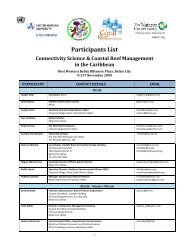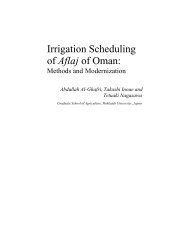The Global Water Crisis: Addressing an Urgent Security - Unu-inweh ...
The Global Water Crisis: Addressing an Urgent Security - Unu-inweh ...
The Global Water Crisis: Addressing an Urgent Security - Unu-inweh ...
Create successful ePaper yourself
Turn your PDF publications into a flip-book with our unique Google optimized e-Paper software.
involvement <strong>an</strong>d empowerment of local communities is essential.<br />
It was discussed that it will be crucial to establish effective policy <strong>an</strong>d legal frameworks in order to develop, carry out <strong>an</strong>d<br />
enforce rules <strong>an</strong>d regulations that govern water <strong>an</strong>d l<strong>an</strong>d use. This will need to be done at local, national <strong>an</strong>d regional<br />
levels through appropriate networks to facilitate cooperative, integrated policy-making that will ease water-related<br />
tensions in the region.<br />
Fin<strong>an</strong>cing is <strong>an</strong> essential component that c<strong>an</strong>not be overlooked, <strong>an</strong>d will be required in order to offset the considerable<br />
costs involved in harnessing <strong>an</strong>d m<strong>an</strong>aging water. This will require third sphere partnerships with the private sector in order<br />
to tap into potential resources <strong>an</strong>d develop solutions that promote socially <strong>an</strong>d environmentally acceptable trade-offs.<br />
Technological innovation will be key for m<strong>an</strong>aging water resources <strong>an</strong>d ensuring continued water security in the region.<br />
Such innovations c<strong>an</strong> act as a driver for ch<strong>an</strong>ge in overcoming social, fin<strong>an</strong>cial <strong>an</strong>d environmental hurdles, creating<br />
successful <strong>an</strong>d sustainable solutions.<br />
Cross-sectoral cooperation via institutions, such as those in the agricultural, industry <strong>an</strong>d energy sectors, c<strong>an</strong> help in dealing<br />
with current <strong>an</strong>d future challenges through reforms such as decentralisation, stakeholder participation <strong>an</strong>d tr<strong>an</strong>sparency,<br />
capacity building, establishing partnerships <strong>an</strong>d coordination (public-private, public-public, public-civil society), <strong>an</strong>d<br />
developing new supra-national (regional) administrative systems.<br />
4. <strong>Water</strong> <strong>an</strong>d Political <strong>Security</strong>: Case Studies from the WANA Region<br />
4.1. <strong>The</strong> Nile Basin Initiative<br />
<strong>The</strong> Nile Basin Initiative (NBI) is a regional initiative covering 10 countries aimed at harmonising the tr<strong>an</strong>sboundary water<br />
conflicts in the Nile basin. <strong>The</strong> dispute over the sharing of the Nile River waters surfaced recently through the introduction<br />
of the Cooperative Framework Agreement (CFA) in 2011 1 . Burundi is the latest signatory to the CFA in 2011, joining Kenya,<br />
Ug<strong>an</strong>da, Ethiopia, T<strong>an</strong>z<strong>an</strong>ia <strong>an</strong>d Rw<strong>an</strong>da. <strong>The</strong> upstream Nile countries, in their struggle for receiving <strong>an</strong> equitable share of<br />
the river’s waters, have negotiated the CFA for years without a full agreement in sight. Egypt, Sud<strong>an</strong> <strong>an</strong>d the Democratic<br />
Republic of Congo, even with the latter expected to sign, are still not party to the CFA. Article 14(b) on water security<br />
in the draft CFA has been used as a stopping block by both Egypt <strong>an</strong>d Sud<strong>an</strong>. <strong>The</strong> article states that member countries<br />
would work together to ensure that they will not “signific<strong>an</strong>tly affect the water security of <strong>an</strong>y other Nile Basin State”<br />
(Nile River Basin Cooperative Framework Agreement, 2010); Egypt <strong>an</strong>d Sud<strong>an</strong> would like for the article to read that the<br />
countries will not “adversely affect the water security <strong>an</strong>d current uses <strong>an</strong>d rights of <strong>an</strong>y other Nile Basin States”, without<br />
the qualification “signific<strong>an</strong>tly” (Nile Basin Initiative, 2012). Through the CFA, the upstream countries seek to substitute<br />
the 1959 treaty between Egypt <strong>an</strong>d Sud<strong>an</strong> that gave nearly 90% of this resource to the two downstream countries –<br />
that is, 55.5 billion m 3 to Egypt, <strong>an</strong>d 18.5 billion m 3 to Sud<strong>an</strong> (Mekonnen, 1999). This treaty did not include <strong>an</strong>y of the<br />
upstream countries, including Ethiopia, which contributes 85% of the river’s water. Based on a provision carried over<br />
from <strong>an</strong> agreement signed with Britain in 1929, Egypt has veto power over <strong>an</strong>y new treaties or proposed agreements<br />
that would affect their allocated share of water resources of the Nile River, which it has been using ever since to protect<br />
its share of the water resources.<br />
<strong>The</strong> signing of the CFA by Burundi came at a crucial time during a major political tr<strong>an</strong>sition in Egypt following the Arab<br />
Spring <strong>an</strong>d the Tahrir Square uprising, followed by the regime ch<strong>an</strong>ge of long-time president Hosni Mubarak. It c<strong>an</strong> be<br />
expected that whatever govern<strong>an</strong>ce structure is established in Egypt, the issue of the Nile waters will be taken very seriously<br />
by its new leaders. In fact, during the first meeting of the Egypti<strong>an</strong> Military Council following the ch<strong>an</strong>ge in regime, the<br />
Nile water issue was the first item on the agenda as it is considered to be a national security issue (AhramOnline, 2012).<br />
Although it remains to be seen what the water diplomacy of the future democratically elected Egypti<strong>an</strong> government will<br />
be, it is <strong>an</strong>ticipated that the new democratic wave will bring with it a new attitude in Egypt towards the sharing of the<br />
Nile River with upstream states.<br />
1 For a copy of the Agreement, see:<br />
http://www.internationalwaterlaw.org/documents/regionaldocs/Nile_River_Basin_Cooperative_Framework_2010.pdf.<br />
50 <strong>The</strong> <strong>Global</strong> <strong>Water</strong> <strong>Crisis</strong>: <strong>Addressing</strong> <strong>an</strong> <strong>Urgent</strong> <strong>Security</strong> Issue




